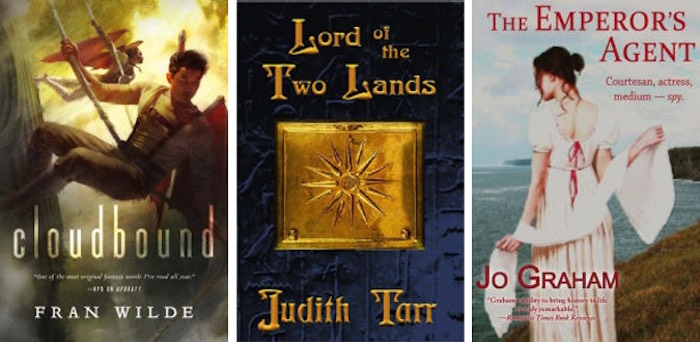The year marches on, and I grow further and further behind in my reading. The to-read pile continues to expand, with Madeline Ashby’s Company Town and Claire North’s The Sudden Appearance of Hope brushing shoulders with Nisi Shawl’s Everfair (such a lovely ARC), Kate Elliott’s Poisoned Blade, Laura Lam’s False Hearts, and Gaie Sebold’s Sparrow Falling. (And foolishly I hope to add to it, with things like Becky Chambers’ A Closed and Common Orbit and Ada Palmer’s Seven Surrenders on the horizon…)
But I did manage to read a handful of novels recently.
Included in their number was Fran Wilde’s Cloudbound, sequel to the award-winning Updraft. Cloudbound’s protagonist, Nat, makes a change from the prickly Kirit of Updraft: Nat takes a little longer to come into his own, but once he does, the narrative really takes off. The world Wilde has created in these novels expands considerably—and so do the politics. But the worldbuilding and the characters is where Cloudbound’s heart really is, and it shows. There is a vividness and a joy to the descriptions of flight, and to the lower levels of the peculiar bone towers in which Nat and Kirit’s society levels. And a delight in marvellous organic weirdness…
I can recommend it as even better than its predecessor.
From a recent historic fantasy Storybundle came two novels I’d been meaning to acquire and read for quite some time. One of them was Judith Tarr’s lyrical, magnificent Lord of the Two Lands.
It’s not often you get a good novel about Alexander the Great. Much less one from the point of view of a woman who is neither his relative nor his lover. Meriamon is the daughter of the last Egyptian Pharaoh—a Pharaoh who died fighting Egypt’s Persian conquerors—and her gods have prophesied that Alexander is to be Egypt’s king. So she has set out to bring him to Egypt, and to his birthright as the son of Amon. But it proves a longer, stranger road than she has anticipated—and Alexander, a different king.
This is—I know Tarr’s work mostly by reputation, and enjoyed her Alamut—but this is more in every way than I expected. More striking. More invested in an exploration of ancient cultures as they could have been—might be, maybe, if you look at them in the right light—and more a variegated tapestry of life and coming-of-age and living and travelling between cultures and histories. And more numinous: the interaction of divine and human things is lightly, deftly sketched, but incredibly powerful and present for all that.
This is a really, really good book. I wish I hadn’t missed it until now.
The Emperor’s Agent by Jo Graham came in the same Storybundle as Judith Tarr’s Lord of the Two Lands. The novels share an interest in Alexander, though in Graham’s The Emperor’s Agent, Napoleon is Alexander reincarnated, and many of his officers are linked to him also by the bonds of past lives. Elza, the novel’s protagonist, is likewise connected to Napoleon and to Alexander: an actress, a courtesan, and a woman who has at times lived in male guise, she is forced by circumstance into the role of spy by the machinations of the Minister for Police, although ultimately she will come to the emperor’s service.
The Emperor’s Agent is a measured sort of novel. Intimate; impossible to categorise. It slides between genres like a shapeshifter, now one thing, now another, yet still forming in itself a coherent whole. I did not expect to like it half so much as I did. And yet I liked it greatly. I want to read more: Elza is a fascinating protagonist, and Graham has a knack of building tension slowly and quietly in character and situation.
I can recommend this too.
What lovely lovely books are you all reading lately?
Liz Bourke is a cranky person who reads books. She holds a Ph.D in Classics from Trinity College, Dublin. Find her at her blog. Or her Twitter.










